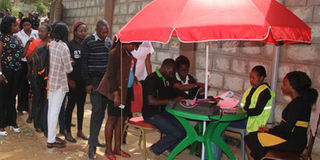Why 2022 vote will be the freest; lessons from twenty years back

Members of the public queue to register as voters at Kenya Medical Training College, Eldoret Campus, on February 14, 2017. PHOTO | JARED NYATAYA | NATION MEDIA GROUP
What you need to know:
The lesson of 2002 is that a ruling party without an incumbent candidate can be crushed at the polls.
The other lesson is that even if the ruling party appears dominant, it may be a paper tiger.
As it turned out, KANU was an empty shell ready to be picked apart like a carcass.
Anno Domini 2022 is so far, yet it’s so near. But I can tell this – unlike the Year of Our Lord 2007 – it won’t be annus horribilis. Unlike 2017, there will be no electoral heist. That’s because the 2022 elections will be the freest and the fairest in the history of Kenya. More of that in a moment.
CORRUPTED MINDS
Three years in a political calendar is a millennium. Many things can, and will, happen. I know this for sure – I will write columns without number profiling mega presidential candidates. My crystal ball will shock with its clarity. I am certain of this because the political dust has already settled. Believe your eyes and distrust your lying ears.
Ordinarily, my mind rejects what the hoi polloi call free and fair elections. That’s because such a thing is the figment of the mind of a simpleton. The concept of a free and fair election is an intellectual absurdity, a philosophical nullity. It’s empirical and normative nonsense. The standards of process purity required to declare an election free and fair simply don’t, and can’t, exist. Voters are too ignorant to make informed choices untainted by bigotry. Their minds are too corrupted by propaganda, innuendo, and the poison that’s money to make a truly democratic choice. Even without the dirty hands of the state, elections aren’t free. However, elections can reflect the will of the electorate even if it’s corrupt.
TRIBALISED ELECTION
When I argue that the 2022 elections will be the freest and fairest, I do so only to accommodate nomenclature that’s popularly understood. It’s not because I think the nomenclature is correct. But you’ve got to work with what you have. In any case, it’s the will of the voters that matters in an election. That’s why if that will is reflected in the results of an election, we should accept it and move on. Just to be sure you understand me, I don’t think the 2007, 2013, and 2017 elections reflected the will of the electorate. That’s why we say colloquially, although we like to think it’s a term of art, that those elections weren’t free and fair.
The last election that reflected the will of the electorate was in 2002. In it, Mwai Kibaki’s National Alliance Rainbow Coalition (NARC), a concoction of Kenya’s most important political ethnic kingpins, beat KANU like a drum. Mr Kibaki ran away with 62 percent of the vote to a measly 31 percent by KANU’s Uhuru Kenyatta. It’s true NARC was an ethnic coalition of all the major ethnic groups in the country except the Kalenjin who went with KANU. So, the 2002 election was corrupted by its ethnic coalitionary nature. It was a tribalised election. In that sense it wasn’t free and fair but it reflected the will of the electors. But we think of it as being free and fair.
NEVER RISEN
Why and how did NARC decimate KANU and turn it into a laughing stock in Kenya’s political landscape? A party that had held untrammeled power since 1964 was cannibalised overnight. Unlike Jesus of Nazareth, KANU has never risen from the dead. It was buried six feet under and there it remains to this day. That’s where ODM’s Raila Odinga, already a legend, got the name Tinga. Like a tractor, he found KANU’s underbelly and devoured its guts from within. But another important factor was at play. The incumbent, Daniel arap Moi, wasn’t running. He had been retired by term limits. As such, he wasn’t there to rig the election for himself against a national tidal wave.
PAPER TIGER
The lesson of 2002 is that a ruling party without an incumbent candidate can be crushed at the polls. The other lesson is that even if the ruling party appears dominant, it may be a paper tiger. As it turned out, KANU was an empty shell ready to be picked apart like a carcass. It had lost it raison d’etre and the will to govern. It was a corrupt vessel used to terrorise Kenyans. Its moral reading on the Richter scale was zero. In 2022, history will repeat itself – exactly two decades later. Already Jubilee has lost the will to govern. It exists in name only. It’s nonsense that’s not even on stilts. Jubilee’s leader, Uhuru Kenyatta, won’t be running.
SUCCESSION PLAN
I know conspiracy theorists think Mr Kenyatta will in 2022 run for office again under another guise. I wouldn’t bet on it. Unless the man from Gatundu is a glutton for punishment, I don’t know why he would want to continue at the helm of a state that’s broke. What makes sense for him is to engineer a succession plan that ensures his security and legacy. That’s why I think the unlikely alliance between him and Mr Odinga through the Handshake should keep presidential aspirants awake at night. In my view, the Handshake settled all the dust in Kenya. The Handshake will birth the freest election since 2002.
Makau Mutua is SUNY Distinguished Professor at SUNY Buffalo Law School and Chair of KHRC. @makaumutua.





